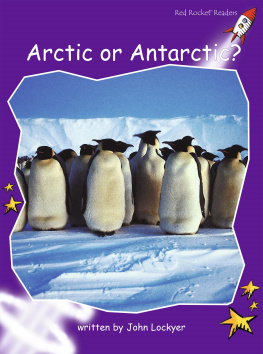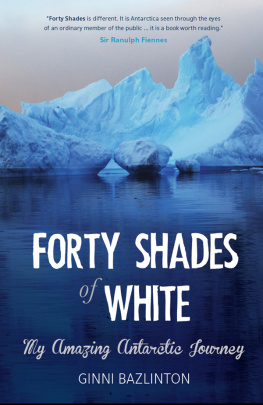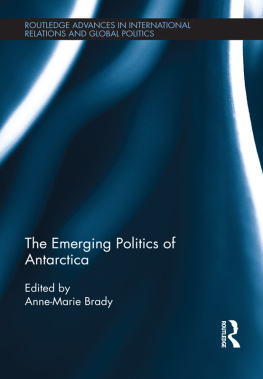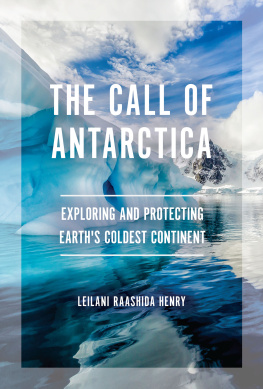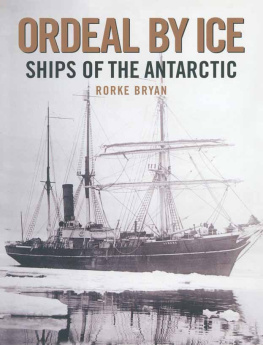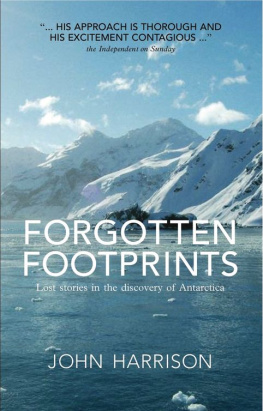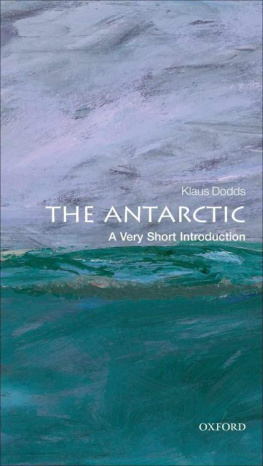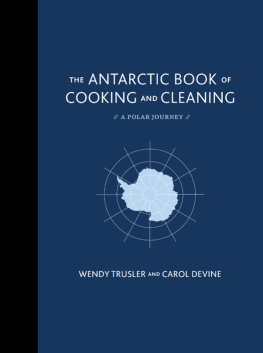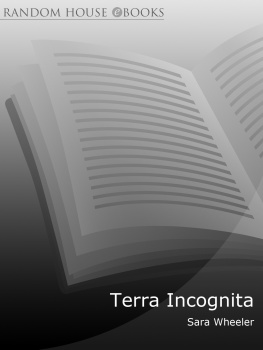Map of Antarctica
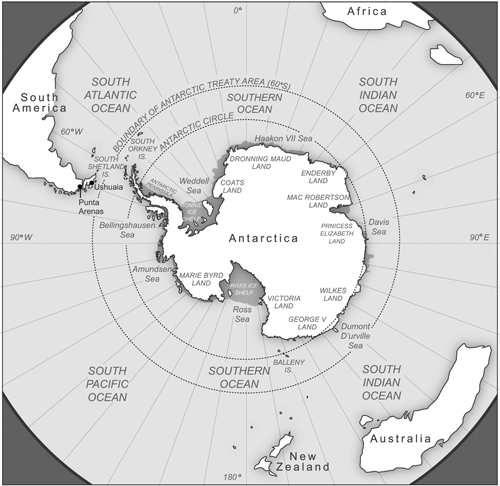
(Joseph Hill)
Antarctica
The Battle for the Seventh Continent
Doaa Abdel-Motaal

Copyright 2016 by Doaa Abdel-Motaal
All rights reserved. No part of this publication may be reproduced, stored in a retrieval system, or transmitted, in any form or by any means, electronic, mechanical, photocopying, recording, or otherwise, except for the inclusion of brief quotations in a review, without prior permission in writing from the publisher.
Library of Congress Cataloging-in-Publication Data
Names: Abdel-Motaal, Doaa, author.
Title: Antarctica : the battle for the seventh continent / Doaa Abdel-Motaal.
Description: Santa Barbara, California : Praeger, 2016. | Includes bibliographical references and index.
Identifiers: LCCN 2016027484 (print) | LCCN 2016038132 (ebook) | ISBN 9781440848032 (hard copy : alk. paper) | ISBN 9781440848049 (ebook)
Subjects: LCSH: AntarcticaEnvironmental conditions. | AntarcticaEconomic conditions. | Global environmental change.
Classification: LCC GE160.A6 A33 2016 (print) | LCC GE160.A6 (ebook) | DDC 341.4/209989dc23
LC record available at https://lccn.loc.gov/2016027484
ISBN: 978-1-4408-4803-2
EISBN: 978-1-4408-4804-9
20 19 18 17 16 1 2 3 4 5
This book is also available as an eBook.
Praeger
An Imprint of ABC-CLIO, LLC
ABC-CLIO, LLC
130 Cremona Drive, P.O. Box 1911
Santa Barbara, California 93116-1911
www.abc-clio.com
This book is printed on acid-free paper 
Manufactured in the United States of America
To Karim
Contents
Acknowledgments
A work of this nature cannot be undertaken without the extensive support of a cadre of academics, policymakers, legal practitioners, climatologists, geologists, and other scientists, as well as a network of professional and amateur mariners, travelers, and experts on Antarctica and the Arctic. The research underlying this book took two years, with months of field work and on-site visits. No work, no matter how noble its intentions or thoroughness, can be exhaustive, however. I am certain that there are areas of the literature, some information, and many opinions that I have failed to reflect, either inadvertently or simply in an attempt to keep the work manageable and focused. All errors and omissions are mine alone, as are any opinions, and there are manysome controversial.
I want to start by thanking Dr. Alan Hemmings, of the Gateway Antarctica Centre for Antarctic Studies and Research, whose extensive and seminal work on Antarctica inspired me and a generation of researchers to pursue this subject. His detailed review of this book is as humbling in its generosity as it is appreciated. I also want to thank Dr. Patrizia Vigni, of the University of Siena for reviewing this work and offering her time, support, and guidance throughout this project. Dr. Rasmus Gjedss Bertelsen, of the University of Troms was instrumental in guiding me toward the exploration of the Svalbard modela critical insight, as will become apparent to the reader.
I am grateful to Michel Rocard, former prime minister of France; Aleqa Hammond, former prime minister of Greenland; Jonas Store, former foreign minister of Norway; and the Governor of Svalbard for their invaluable contributions and input. I also want to thank Dr. Kevin Hughes, of the British Antarctic Survey, for his critical insights on Antarcticas environmental governance; and Dr. John Turner, of the British Antarctic Survey, for patiently teaching me Antarcticas complex climate system. I am indebted to Dr. Adam Grydehoj, of Island Dynamics, for so generously discussing with me the sociology of Svalbard, Dr. Francesco Orrego Vicuna, of the University of Chile, and Dr. Tullio Treves, a professor at the University of Milan and a judge in the International Tribunal of the Law of the Sea, for helping me untangle the complexities the of the Law of the Sea and legal principles such as the Common Heritage of Mankind. I extend my thanks to all of them for agreeing to provide invaluable interviews for this book.
In addition, I am grateful to the Antarctic Treaty Secretariat, the Scientific Committee on Antarctic Research, and the International Seabed Authority for their assistance with all background documentation. I want to thank the Museo Nazionale dellAntartide in Siena for allowing me to see Antarctic gold and other mineral deposits firsthand and for connecting me with geologists, experts on Antarctic mineral resources, and the Programma Nazionale di Ricerche in Antartide in Italy. I want to thank Dr. Laura Crispini of the University of Genova for walking me through the complex geology of Antarctica, its mineral resources, and her work on gold deposits. I want to thank the U.S. Geological Survey for their collaboration and all the material that they shared so generously to enable this work. The dedication, expertise, and generosity of these institutions speaks volumes about humanitys capacity for collaborative work and noble intentions on matters affecting our common planetary heritage. I remain humbled by the encouragement and support that I received from professionals in these organizations, whose expertise in their field and time constraints dwarf mine.
This work would not have been possible without National Geographic Expeditions and the Earthwatch Institute, who enabled me to travel throughout the Antarctic and the Arctic. My work with the Earthwatch Institute on climate change in the Canadian sub-Arctic allowed me to appreciate firsthand the relentless pace of climate change and the challenges and opportunities for human habitation of remote, ice-covered lands. Last but not least, I want to thank cartographer Joseph Hill, whose endless patience enabled the preparation of all the maps for this book; Bill Watkins of Literary Solutions, who lifted this work to a higher editorial standard; and Jessica Gribble from Praeger, my publisher.
ONE
Introduction
To many experts, there has not been, and will never be, a battle for Antarctica. This continent is remote, inaccessible, and covered in ice, it may not have natural resources, and it has no indigenous inhabitants. Moreover, it is governed by the Antarctic Treaty System (ATS), which is widely celebrated as one of the most successful international legal regimes. This regime brought peace and security to the continent and preserved its pristine environment through a ban on mining.
Emerging from the International Geophysical Year (IGY) of 19571958, a year in which the international community came together to further the aims of science, was the 1959 Antarctic Treaty, which is the cornerstone of the ATS. This treaty dedicated the continent to peace and scientific inquiry. The notion that there could one day be a battle for Antarctica, therefore, will seem outlandish to manya theory peddled by scaremongerers with a limited understanding of Antarctic exceptionalism. This exceptionalism was reinforced as recently as the 20072008 International Polar Year (IPY), which reconfirmed the primacy of science.
The ATS has been the envy of the Arctic. Academics and policymakers alike have looked at Antarctica with bewilderment. If a regime such as the ATS is possible down south, why has it not found a parallel in the north? Why is Antarctica covered by the Protocol on Environmental Protection to the Antarctic Treaty (a 1991 addition to the ATS), and its wilderness left intact, when the Arctic is solely governed by the Arctic Council, a loose forum for dialogue among the main eight Arctic powers?
Next page


